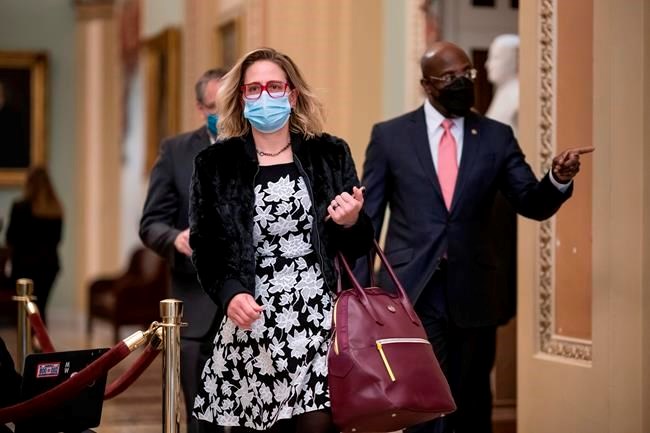WASHINGTON — Democratic leaders have a potent dynamic on their side as Congress preps for its first votes on the party’s $1.9 trillion COVID-19 relief bill: Would any Democrat dare cast the vote that scuttles new President Joe Biden’s leadoff initiative?
Democrats' thin 10-vote House majority leaves little room for defections in the face of solid Republican opposition, and they have none in a 50-50 Senate they control only with
Yet with the House Budget Committee advancing the 591-page package Monday, Democrats across the party's spectrum show little indication they're willing to embarrass Biden with a high-profile defeat a month into his presidency.
Such a setback would deal early blows to Biden, new Senate Majority Leader Chuck Schumer, D-N.Y., and California Democrat Nancy Pelosi in what could be her last term as House speaker. It could also wound congressional Democrats overall by risking repercussions in the 2022 elections if they fail to unite effectively against clear enemies like the pandemic and the frozen economy.
“You think very seriously before casting a deciding vote against your own party's president's legislative agenda,” said Ian Russell, a Democratic consultant. But he cautioned that lawmakers must decide “for themselves how their vote is going to play out" at home.
The issue that's provoked the deepest divisions is a progressive-led drive to boost the federal minimum wage to $15 hourly over five years. The current $7.25 minimum took effect in 2009.
“It was the No. 1 priority for progressives,” Rep. Pramila Jayapal, D-Wash., chair of the Congressional Progressive Caucus, said in an interview last week. “This is something we've run on and something we've promised to the American people.”
An overall relief bill, including the minimum wage boost, is expected to clear the House, and likely the Senate as well. But the minimum wage boost's fate is shaky in the Senate, where Joe Manchin of West Virginia, perhaps the chamber's most conservative Democrat, has said $15 is too expensive. Sen. Kyrsten Sinema, D-Ariz., has suggested she might oppose it, too.
More ominously, the Senate parliamentarian is expected to rule soon on whether the minimum wage provision must be tossed from the bill. Under expedited procedures Democrats are using, items that aren't principally budget-related can’t be included, and it's unclear if Democrats would have the votes to overturn such a decision.
Yet with every Democrat having leverage because virtually all votes are needed, there have been no overt threats to take the entire bill down unless they get their way.
Senate Budget Committee Chair Bernie Sanders, I-Vt., his chamber's chief minimum wage sponsor, said Democrats must “act boldly” and approve a package with the minimum wage increase. He answered indirectly when asked if he'd be willing to compromise to keep the plan in the overall bill.
“Every Democrat understands that at this moment in history, this unprecedented moment of pain and suffering for working families, it is absolutely imperative we support the president, that we do what the American people want and we pass that package,” he said in an interview.
Rep. Brad Schneider, D-Ill., a leading House moderate, also
The House Budget Committee advanced the bill Monday by a near party-line 19-16, setting up House passage at perhaps week's end. Rep. Lloyd Doggett, D-Texas, voted no, but an aide said he misunderstood the vote after disembarking from a plane and supports the measure.
“Aggressive, bold action is needed before our nation is more deeply and permanently scarred,” said Budget Committee Chair John Yarmuth, D-Ky., citing evolving coronavirus strains.
Republicans said the measure's higher minimum wage and increased unemployment benefits would cost jobs or discourage people from seeking work, and said much of the spending was wasteful.
“This is the wrong plan for America’s working class,” said Rep. Jason Smith, R-Mo., the budget panel's top Republican. Across the Capitol, Senate Minority Leader Mitch McConnell, R-Ky., said Democrats were pushing “Band-Aid policies like they’re planning for another year of stagnation, instead of trying to set up success.”
The bill would provide $1,400 payments to millions of low- and middle-income people, increase child tax credits and offer extra $400 weekly federal unemployment benefits through August. It would provide hundreds of billions of dollars for state and local governments, shuttered schools, COVID-19 vaccines and testing, and struggling airlines and other businesses.
History has rich examples of lawmakers who faced pivotal decisions on whether to back priorities of their parties’ presidents, with mixed results.
Three GOP defections in 2017, most famously a post-midnight thumbs-down by Sen. John McCain, R-Ariz., brought down President Donald Trump’s trademark effort to repeal the Obama-era Affordable Care Act. McCain’s vote sparked unending enmity from Trump. Of the other two, Maine Sen. Susan Collins was reelected last year, and Alaska Sen. Lisa Murkowski faces reelection in 2022.
In 1993, President Bill Clinton’s $500 billion deficit-reduction plan passed the House by a single vote after first-term Rep. Marjorie Margolies-Mezvinsky agreed to support it. Mezvinsky, who’d previously criticized the measure for insufficient spending cuts, voted “yes” after Clinton called her in the House cloakroom during the vote.
“I told him I knew how important it was and I wouldn’t let it go down, but I said I would only be the tiebreaking vote,” she recalled last week in an interview. She said she told him, “If I pull you over the top, you’ll lose this seat.”
Both scenarios played out.
The package passed 218-216, saved by her decisive vote. And the lawmaker, whose last name is now Margolies following a divorce, lost her reelection two years later from what was a heavily GOP district in Philadelphia’s suburbs. She never returned to Congress.
But one of her children, Marc Mezvinsky, married Clinton’s daughter, Chelsea, in 2010.
Alan Fram, The Associated Press



